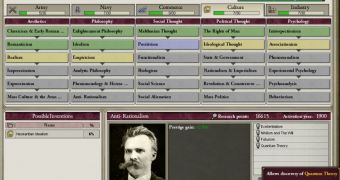Victoria II is the latest grand strategy title launched by Paradox Interactive, aiming to simulate the complex mix of diplomacy, wars and social upheaval that characterized the period between 1836 and 1936.
One of the great things about history oriented videogames is that they teach you thing and I wouldn't be surprised to learn that some of the Research tab for Victoria II was created by someone with a passion for education and for the major philosophical trends that emerged from the intelligentsia of the XIX century.
One of the easiest ways to get to Great Power status early on when playing a minor or of conserving position is to go to the Culture tab of the research tree and grab as many of the technologies that seems like they have no use, pushing forward things like culture, biology research or development of philosophical thought.
It might not seem like a smart move for a big country that needs to contend with aggressive neighbors, the need to industrialize and the need to create a powerful army and maybe even navy.
But prestige is important because it determines the order in which nations get access to the world market, an increasingly important puzzle of the trade game in the game and during the time period.
So a small nation that can get prestige enhancements really quickly has the power to keep its population supplied and very much content while a behemoth that focuses on industry, like Austria, can be quickly crippled by a host of rebels popping up all over the place in the space of a few months.
And as philosophy and politics develop ideologies spring into action, from fascists, who usually appear early in the XX century, to communists and with a number of others in the middle.
One of the most fascinating things near the end game is to see how each of the parties that can get access to power will mange the country and how the population will react to their ascendance to power.
There's nothing like shifting a mostly democratic Prussia to the socialists and see how that plays out in the long term.

 14 DAY TRIAL //
14 DAY TRIAL //